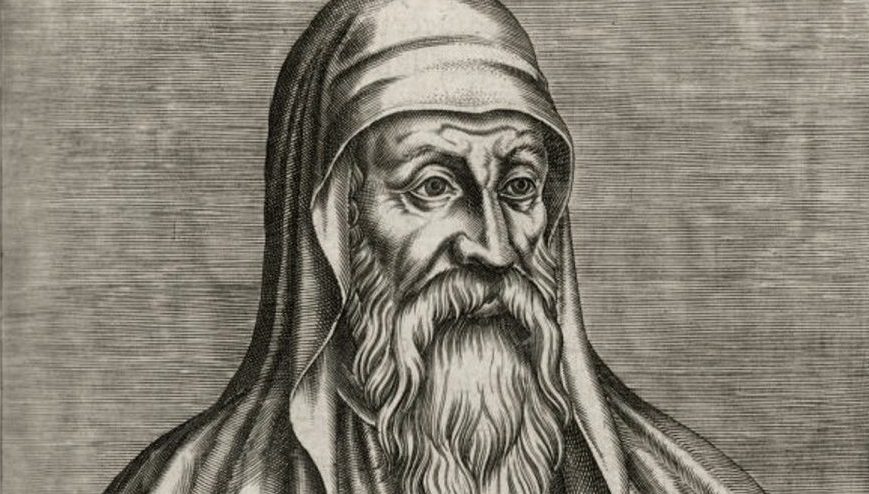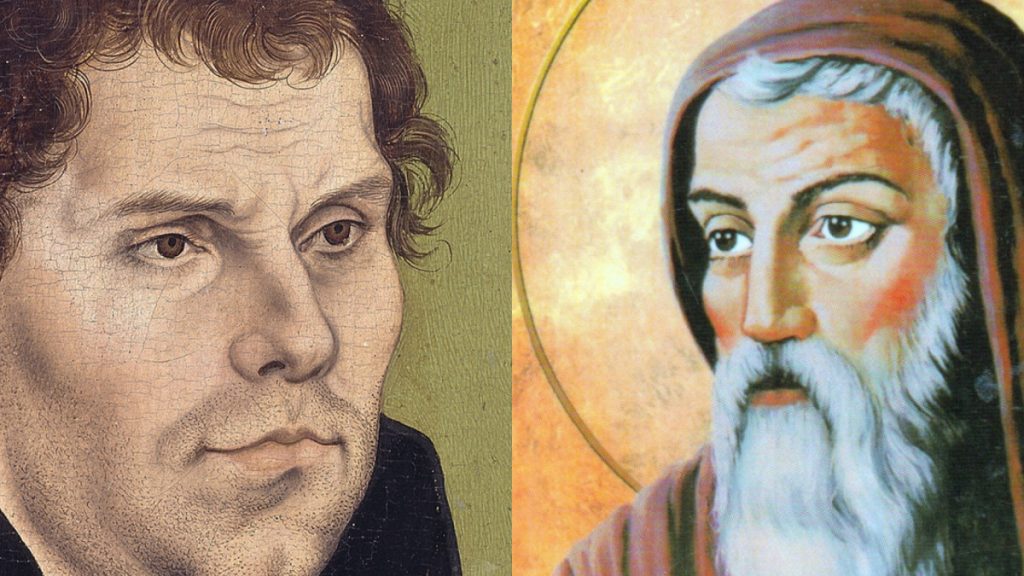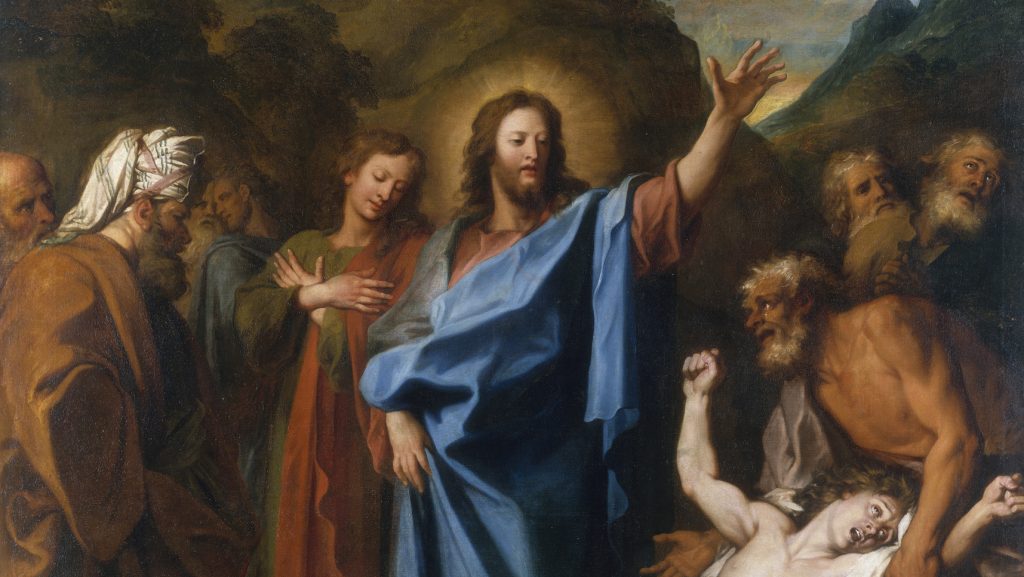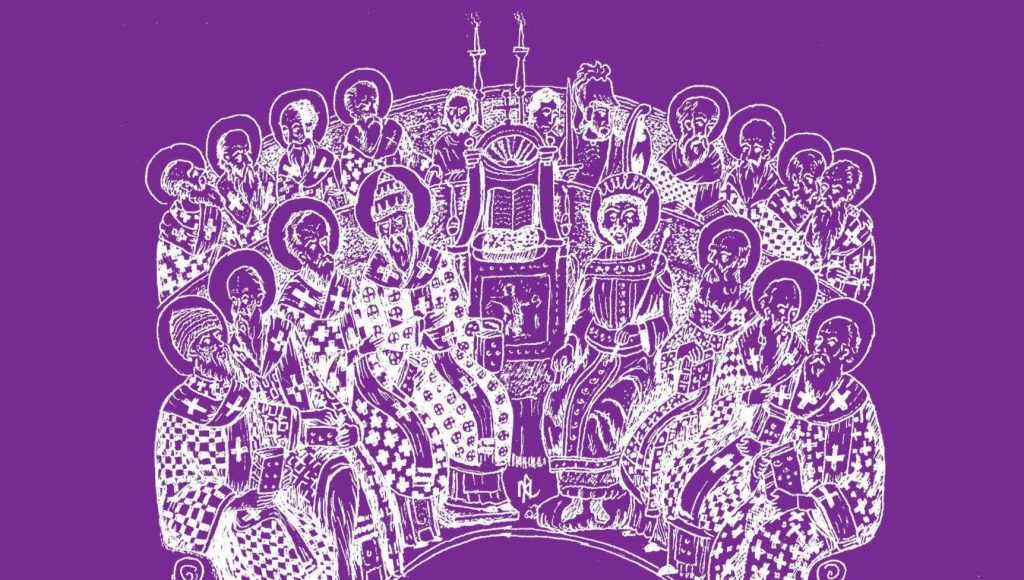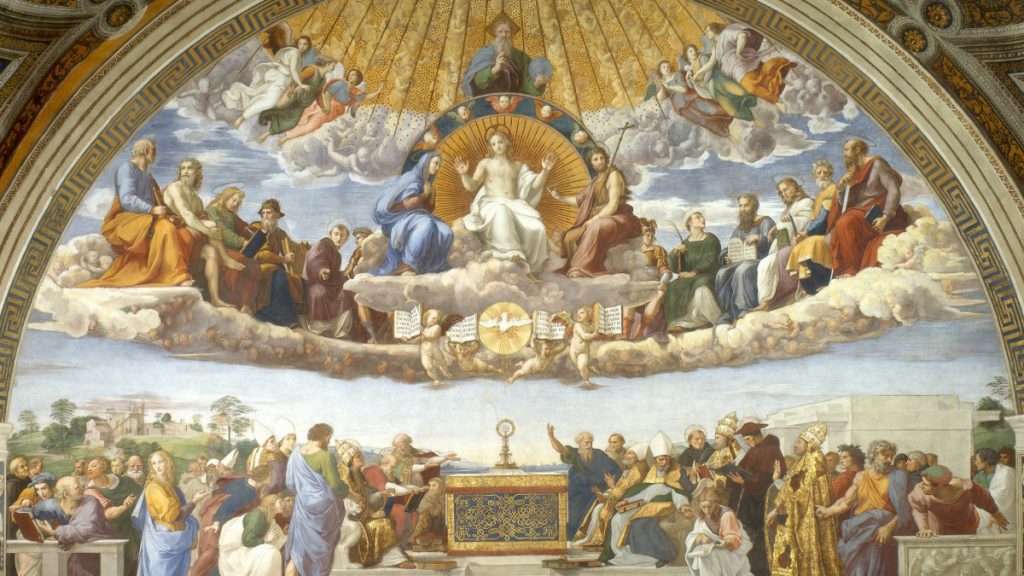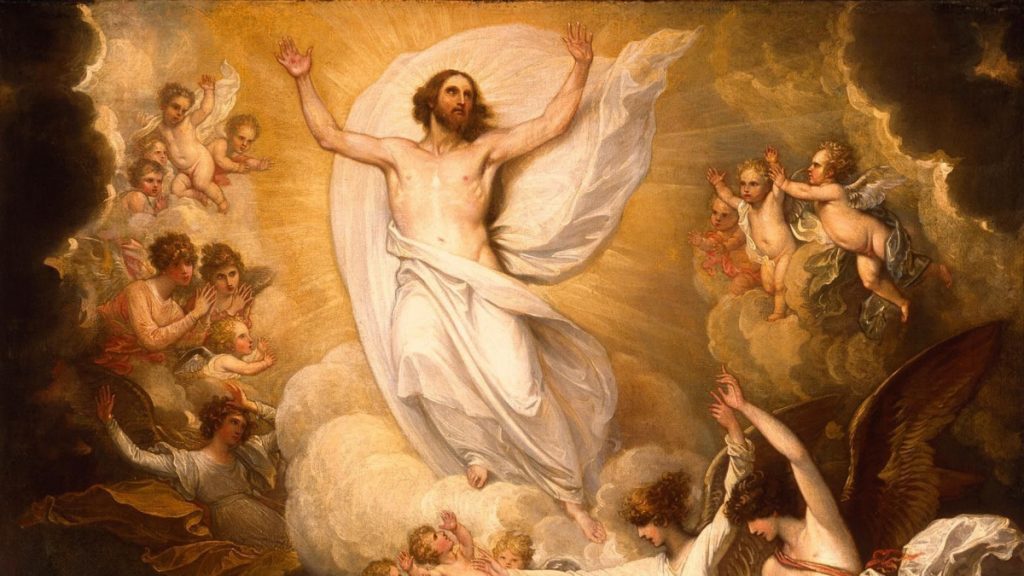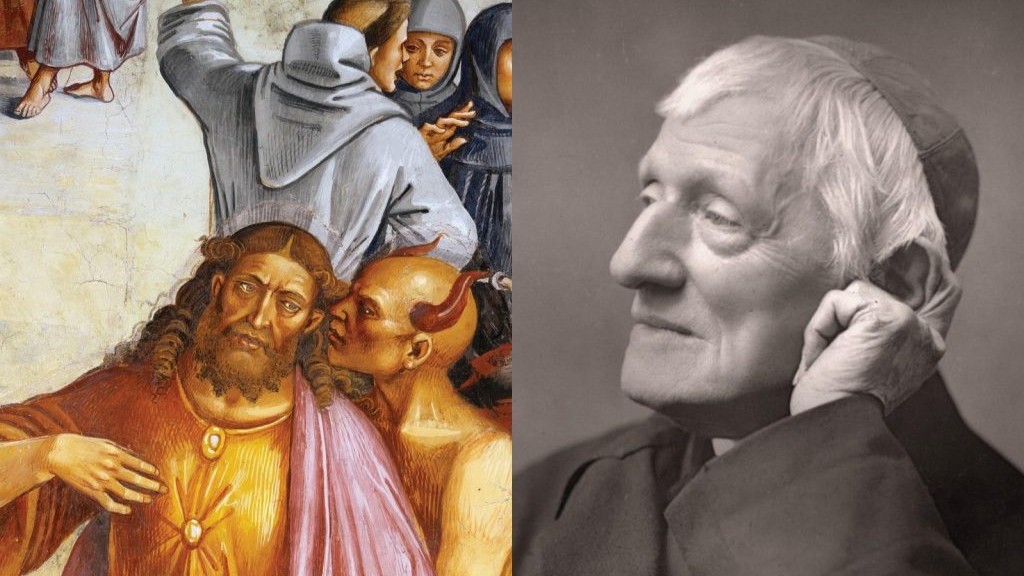(Updated July 17, 2025)
This Author Quote archive collects pertinent quotes from the Ecclesiastical Writer, Origen.
Next to each quote are the Topic Quote Archives in which they are included.
This Quote Archive is being continuously updated as research continues. Quotes marked with “***” have not yet been organized into their respective Topic Quote Archives.
Treatises
Origen, On First Principles, or De Principiis (c. 225)
- Apostolic Tradition | Preface, §2
- Development of Doctrine | Preface, §§2-3
- The Heretical and Schismatic Spirit | Book 4, Ch. 1, §§7-9
(§2) Since many, however, of those who profess to believe in Christ differ from each other, not only in small and trifling matters, but also on subjects of the highest importance, as, e.g., regarding God, or the Lord Jesus Christ, or the Holy Spirit; and not only regarding these, but also regarding others which are created existences, viz., the powers and the holy virtues; it seems on that account necessary first of all to fix a definite limit and to lay down an unmistakable rule regarding each one of these, and then to pass to the investigation of other points. For as we ceased to seek for truth (notwithstanding the professions of many among Greeks and Barbarians to make it known) among all who claimed it for erroneous opinions, after we had come to believe that Christ was the Son of God, and were persuaded that we must learn it from Himself; so, seeing there are many who think they hold the opinions of Christ, and yet some of these think differently from their predecessors, yet as the teaching of the Church, transmitted in orderly succession from the apostles, and remaining in the Churches to the present day, is still preserved, that alone is to be accepted as truth which differs in no respect from ecclesiastical and apostolic tradition.
(§3) Now it ought to be known that the holy apostles, in preaching the faith of Christ, delivered themselves with the utmost clearness on certain points which they believed to be necessary to everyone, even to those who seemed somewhat dull in the investigation of divine knowledge; leaving, however, the grounds of their statements to be examined into by those who should deserve the excellent gifts of the Spirit, and who, especially by means of the Holy Spirit Himself, should obtain the gift of language, of wisdom, and of knowledge; while on other subjects they merely stated the fact that things were so, keeping silence as to the manner or origin of their existence; clearly in order that the more zealous of their successors, who should be lovers of wisdom, might have a subject of exercise on which to display the fruit of their talents—those persons, I mean, who should prepare themselves to be fit and worthy receivers of wisdom.
(§7) …Many, not understanding the Scriptures in a spiritual sense, but incorrectly, have fallen into heresies.
(§8) …Thereupon the heretics…there being different and discordant opinions among them even on this very point, because, when they once depart from a belief in God the Creator, who is Lord of all, they have given themselves over to various inventions and fables, devising certain (fictions), and asserting that some things were visible, and made by one (God), and that certain other things were invisible, and were created by another, according to the vain and fanciful suggestions of their own minds. But not a few also of the more simple of those, who appear to be restrained within the faith of the Church, are of opinion that there is no greater God than the Creator, holding in this a correct and sound opinion; and yet they entertain regarding Him such views as would not be entertained regarding the most unjust and cruel of men.
(§9) Now the reason of the erroneous apprehension of all these points on the part of those whom we have mentioned above [heretics], is no other than this, that holy Scripture is not understood by them according to its spiritual, but according to its literal meaning. And therefore we shall endeavor, so far as our moderate capacity will permit, to point out to those who believe the holy Scriptures to be no human compositions, but to be written by inspiration of the Holy Spirit, and to be transmitted and entrusted to us by the will of God the Father, through His only-begotten Son Jesus Christ, what appears to us, who observe things by a right way of understanding, to be the standard and discipline delivered to the apostles by Jesus Christ, and which they handed down in succession to their posterity, the teachers of the holy Church. Now, that there are certain mystical economies [dispensations] indicated in holy Scripture, is admitted by all, I think, even the simplest of believers. But what these are, or of what kind they are, he who is rightly minded, and not overcome with the vice of boasting, will scrupulously [religiously] acknowledge himself to be ignorant. For if anyone, e.g., were to adduce the case of the daughters of Lot, who seem, contrary to the law of God, to have had intercourse with their father, or that of the two wives of Abraham, or of the two sisters who were married to Jacob, or of the two handmaids who increased the number of his sons, what other answer could be returned than that these were certain mysteries, and forms of spiritual things, but that we are ignorant of what nature they are? Nay, even when we read of the construction of the tabernacle, we deem it certain that the written descriptions are the figures of certain hidden things; but to adapt these to their appropriate standards, and to open up and discuss every individual point, I consider to be exceedingly difficult, not to say impossible. That that description, however, is, as I have said, full of mysteries, does not escape even the common understanding. But all the narrative portion, relating either to the marriages, or to the begetting of the children, or to battles of different kinds, or to any other histories whatever, what else can they be supposed to be, save the forms and figures of hidden and sacred things? As men, however, make little effort to exercise their intellect, or imagine that they possess knowledge before they really learn, the consequence is that they never begin to have knowledge or if there be no want of a desire, at least, nor of an instructor, and if divine knowledge be sought after, as it ought to be, in a religious and holy spirit, and in the hope that many points will be opened up by the revelation of God—since to human sense they are exceedingly difficult and obscure—then, perhaps, he who seeks in such a manner will find what it is lawful to discover.
Origen, Against Celsus (c. 248)
(Book 4, Ch. 7) ***
To which we answer, that there never was a time when God did not wish to make men live righteous lives; but He continually evinced His care for the improvement of the rational animal, by affording him occasions for the exercise of virtue. For in every generation the wisdom of God, passing into those souls which it ascertains to be holy, converts them into friends and prophets of God. And there may be found in the sacred book (the names of) those who in each generation were holy, and were recipients of the Divine Spirit, and who strove to convert their contemporaries so far as in their power.
But as it is in mockery that Celsus says we speak of “God coming down like a torturer bearing fire,” and thus compels us unseasonably to investigate words of deeper meaning, we shall make a few remarks, sufficient to enable our hearers to form an idea of the defense which disposes of the ridicule of Celsus against us, and then we shall turn to what follows. The divine word says that our God is “a consuming fire” (Deut. 4:24; 9:3), and that “He draws rivers of fire before Him” (Dan. 7:10); nay, that He even enters in as “a refiner’s fire, and as a fuller’s herb” (Mal. 3:2) to purify His own people. But when He is said to be a “consuming fire,” we inquire what are the things which are appropriate to be consumed by God. And we assert that they are wickedness, and the works which result from it, and which, being figuratively called “wood, hay, stubble” (1 Cor. 3:12), God consumes as a fire. The wicked man, accordingly, is said to build up on the previously-laid foundation of reason, “wood, and hay, and stubble.” If, then, anyone can show that these words were differently understood by the writer, and can prove that the wicked man literally builds up “wood, or hay, or stubble,” it is evident that the fire must be understood to be material, and an object of sense. But if, on the contrary, the works of the wicked man are spoken of figuratively under the names of “wood, or hay, or stubble,” why does it not at once occur (to inquire) in what sense the word “fire” is to be taken, so that “wood” of such a kind should be consumed? For (the Scripture) says: “The fire will try each man’s work of what sort it is. If any man’s work abide which he hath built thereupon, he shall receive a reward. If any man’s work be burned, he shall suffer loss” (1 Cor. 3:13-15). But what work can be spoken of in these words as being “burned,” save all that results from wickedness? Therefore our God is a “consuming fire” in the sense in which we have taken the word; and thus He enters in as a “refiner’s fire,” to refine the rational nature, which has been filled with the lead of wickedness, and to free it from the other impure materials, which adulterate the natural gold or silver, so to speak, of the soul. And, in like manner, “rivers of fire” are said to be before God, who will thoroughly cleanse away the evil which is intermingled throughout the whole soul. But these remarks are sufficient in answer to the assertion, “that thus they were made to give expression to the erroneous opinion that God will come down bearing fire like a torturer.”
Origen, On Prayer
- Patriarchy, Feminism, and the Roles of Men and Women | Ch. 5
- The Communion of Saints: Intercession and Relics | Ch. 11, §§1-3, 5
And further, a woman ought, most of all at prayer, to preserve simplicity and decency in soul and body, above all and especially while she prays reverencing God and expelling from her intellect every wanton womanish recollection, arrayed not in chaplets and gold or pearls or costly raiment, but in the things in which it becomes a woman of pious profession to be arrayed, (and I marvel that anyone should hesitate, were it on the strength of such a condition alone, to pronounce her blessed who has thus presented herself for prayer) as Paul has taught in the same Epistle when he says, “in like manner that women array themselves decently in simplicity with modesty and discretion, not in chaplets and gold or pearls or costly raiment, but, as becomes woman of pious profession, through good works” (1 Tim. 2:9).
(Ch. 10) ***
Now request and intercession and thanksgiving, it is not out of place to offer even to men—the two latter, intercession and thanksgiving, not only to saintly men but also to others. But request to saints alone, should some Paul or Peter appear, to benefit us by making us worthy to obtain the authority which has been given to them to forgive sins—with this addition indeed that, even should a man not be a saint and we have wronged him, we are permitted our becoming conscious of our sin against him to make request even of such, that he extend pardon to us who have wronged him.
(Ch. 11, §§1-3, 5)1
(§1) It is not only the High Priest who prays with those who truly pray, but also the angels who “have joy in heaven upon one sinner that doth penance, more than upon ninety-nine just who need not penance” (Luke 15:7), and also the souls of the saints who have passed away. This is clear from the case of Raphael offering a rational sacrifice to God for Tobias and Sara [Tob. 12:12]. For the Scripture says that after they had prayed, “the prayers of them both were heard in the sight of the glory of the great Raphael, and he was sent to heal them both” (Tob. 3:16-17). And Raphael himself, in revealing to them his 29 | 30 mission to them both, enjoined upon him as an angel by God, says: “When thou didst pray now, thou and thy daughter in law Sara, I offered the memory of your prayer before the holy one” (Tob. 12:12); and a little further on: “I am Raphael, one of the seven angels who bear up [the prayers of the saints] and enter before the glory of the holy one” (Tob. 12:15). And so, according to the word of Raphael, “prayer is good with fasting and alms and justice” (Tob. 12:8). And in the case of Jeremias [Jeremiah], who appears in the Maccabees as “admirable for age and glory” (2 Mac. 15:13) so that “an extraordinary dignity and greatness” was about him, and who “stretched forth his right hand and gave to Judas a sword of gold” (2 Mac. 15:15)–to him another holy man who had died [Onias, the High Priest] bore witness saying: “This is he that prayeth much for the people and for all the holy city, Jeremias the prophet of God” (2 Mac. 15:14).
(§2) And as knowledge is revealed to the saints “now through a glass in a dark manner,” but “then face to face” (1 Cor. 13:12), so it would be unreasonable not to employ the analogy for all the other virtues also, which if prepared already in this life will be perfected in the next. Now the one great virtue according to the Word of God is love of one’s neighbor. We must believe that the saints who have died have this love in a far greater degree towards them that are engaged in the combat of life, than those who are still subject to human weakness and are engaged in the combat along with their weaker brethren. The saying: “If one member suffer any thing, all the members suffer with it; or if one member glory, all the members rejoice with it” (1 Cor. 12:26), does not apply only to those who here on earth love their brethren. For one can quite properly say also of the love of those who have quit this present life: “…the solicitude for all the churches. Who is weak, and I am not weak? Who is scandalized, and I am not on fire?” (2 Cor. 11:28-29). And Christ Himself agrees with this, saying that with each of the saints that are sick, He also is sick, and in prison, and naked and a stranger and hungry and thirsty [Matt. 25:35-40]. Who is there that takes up the Gospel that does not know that Christ, by referring to Himself whatever befalls those who believe in Him, regards their sufferings as His own?
(§3) If the angels of God “came” to Jesus “and ministered to Him” (Matt. 4:11), and if it is not right for us to believe that this ministry of the angels to Jesus was for a short time only during His bodily sojourn among men, when He was still “in the midst” of those who believed, not as “he that sitteth at table” but as “he that serveth” (Luke 22:27), how many angels, do you think, minister to Jesus who wishes to “gather together the sons of Israel one by one” and assemble those of the dispersion and saves them that are in fear and “call upon Him” (Isa. 27:12; John 10:16; 11:52; Acts 2:21; Rom. 10:12; etc.)? And do they not contribute more than the apostles to the growth and increase of the Church, so that John says in the 30 | 31 Apocalypse that certain angels stand over the churches [Apoc. 1:20; 2:1, 8, 12, 18; 3:1, 7, 14]? Nor is it in vain that “the angels of God ascend and descend upon the Sons of man,” and are seen by eyes “illumined by the light of knowledge” (John 1:51; Hos. 10:12, LXX)…
(§5) We must not, therefore, think that when these things happen they happen by chance. For He who “has numbered all the hairs on the head” (Luke 12:7) of the saints brings together in harmony at the time of prayer both him who can do a service, giving ear to him who is in need of His benevolence, and the one who devoutly prays. In the same way we must suppose that the angels who are the overseers and ministers of God are present to one who is praying in order to ask him for what he petitions. The angel, indeed, of each one, even of the “little ones” in the Church, always “seeing the face of the Father who is in heaven” (Luke 18:10) and beholding the divinity of our Creator, prays with us and cooperates with us, as far as is possible, in what we seek.
(Ch. 18) ***
In the Gospel according to John the language referring to the forgiveness exercised by the apostles runs thus: “Receive the Holy Spirit: whosoever’s sins you forgive, they are forgiven unto them; whosoever’s you hold, they are held” (John 20:22-23). Anyone taking these words without discrimination might blame the apostles for not forgiving all men in order that all might be forgiven but holding the sins of some so that they are held with God also on their account.
It is helpful to take an example from the Law with a view to understand God’s forgiveness of sins through men. Legal priests are prohibited from offering sacrifice for certain sins in order that the persons for whom the sacrifices are made may have their misdeeds forgiven; and though the priest has authority to make offerings for certain involuntary or willful misdeeds, he of course does not presume to offer a sacrifice for sin in cases of adultery or willful murder or any other more serious offense.
So, too, the apostles, and those who have become like apostles, being priests according to the Great High Priest and having received knowledge of the service of God, know under the Spirit’s teaching for which sins, and when, and how they ought to offer sacrifices, and recognize for which they ought not to do so.
Origen, Exhortation to Martyrdom
- The Sacrament of Baptism | §30
- The Communion of Saints: Intercession and Relics | §30
- The Sacrament of Holy Orders, and the Authority of the Priesthood | §30
(§30)2
Let us remember also the sins that we have committed, and that except by baptism it is not possible to obtain remission of sins. But according to the laws of the Gospel one cannot be baptized twice in water and the spirit for the remission of sins. We are given, however, the baptism of martyrdom. Obviously it bears this name from the fact that to the text “Can you drink of the chalice that I drink?” there is subjoined “or be baptized with the baptism wherewith I am baptized?” (Mark 10:39). Note also that the baptism of martyrdom, as received by our Savior, atones for the world; so, too, when we receive it, it serves to atone for many. Just as they who assisted at the altar according to the law of Moses seemed to procure for the Jews remission for sins by the blood of goats and oxen, so the souls of believers that “are beheaded for the testimony of Jesus” (Apoc. 20:4), do not assist in vain at the altar of heaven, but procure for them that pray the remission of sins. And likewise we learn that as the High Priest Jesus Christ offered Himself in sacrifice, so the priests, whose leader He is, also offer themselves in sacrifice; for this reason one sees them at the altar as their proper place. But while some of the priests were without blemish and offered victims without blemish and so performed the divine service, others had blemishes such as are listed by Moses in Leviticus [Lev. 21:17-21], and were kept away from the altar. Who then is the priest without blemish who can offer a victim without blemish, if not he who bears witness to the last and fulfills every requirement of the concept of martyrdom? We have already spoken of him above [Christ].
Biblical Commentaries
Origin, Commentary on Matthew (c. 249)
- Holy Mary, Mother of God | Book 10, Ch. 17
- Mortal Sin: Christians Can Lose Their Salvation | Book 14, Ch. 10
- The Papacy and the Invincibility of the Church | Book 13, Ch. 31
- The Sacrament of Marriage, Divorce, and Contraception | Book 14, Ch. 24
- End Times | Commentary on 24:2
(Book 10, Ch. 17)3
Now some, using a tradition from the Gospel with the title, According to Peter, or the Book of James [Protoevangelium] as their starting point, say that the brothers of Jesus were sons of Joseph from a wife prior to Mary. Those who say this wish to preserve the dignity of Mary in virginity until the end, so that that body which was judged to have served the Logos which said, “The Holy Spirit will come upon you and the power of the Most High will overshadow you,” should not experience a sexual relationship with a man after the Holy Spirit came upon her and the power from on high overshadowed her. And I think it is reasonable that Jesus became the first-fruits of male purity in chastity, and Mary of female, for it is not pious that the first-fruits of virginity be attributed to another besides her.
But since it was necessary, even if something in common had been said in the case of Peter and those who had thrice admonished the brethren, that Peter should have some element superior to those who thrice admonished, in the case of Peter, this saying “I will give to you the keys of the kingdom of the heavens” (Matt. 16:19), has been specially set before the words, “And whatever things you shall bind on earth,” etc. And, indeed, if we were to attend carefully to the evangelical writings, we would also find here, and in relation to those things which seem to be common to Peter and those who have thrice admonished the brethren, a great difference and a pre-eminence in the things said to Peter, compared with the second class. For it is no small difference that Peter received the keys not of one heaven but of more, and in order that whatsoever things he binds on the earth may be bound not in one heaven but in them all, as compared with the many who bind on earth and loose on earth, so that these things are bound and loosed not in the heavens, as in the case of Peter, but in one only; for they do not reach so high a stage, with power as Peter to bind and loose in all the heavens [Matt.16:19]. The better, therefore, is the binder, so much more blessed is he who has been loosed, so that in every part of the heavens his loosing has been accomplished.
But observe here that every great sin is a loss of the talents of the master of the house, and such sins are committed by fornicators, adulterers, abusers of themselves with men, effeminate, idolaters, murderers…
But as a woman is an adulteress, even though she seem to be married to a man, while the former husband is still living, so also the man who seems to marry her who has been put away, does not so much marry her as commit adultery with her according to the declaration of our Savior.
(Commentary on 24:2)4
After Christ predicted everything that was about to happen to Jerusalem, he who had preserved the temple left it, lest it collapse while he was still in it. The temple stood safe and secure as long as the Word and the kingdom of God were with the Jews, as did all things Jewish. Subsequently, however, the kingdom of God was taken from the Jews and given to the Gentiles, as it is written, “The kingdom of God will be taken away from you and given to the nations who produce its fruit” (Matt. 21:43). Both Jesus and the kingdom of God were then established among the Gentiles. Therefore neither Jesus nor the kingdom of God is to be found among the Jews, because they were abandoned “like a booth in a vineyard and like a hut in a cucumber field and like a city besieged” (Isa. 1:8), on account of the crime they committed against Christ.
Origen, Commentary on John
- The Canon of Scripture | Book 5, §3
- The Papacy and the Invincibility of the Church | Book 5, §3
- The Sacrament of Baptism | Book 6, §17
(Book 5, §3)5
Paul, who was made a competent minister of the new covenant, not in the letter, but in the spirit [2 Cor. 3:6], who completed preaching the gospel from Jerusalem, as far as Illyricum [Rom. 15:19], did not even write to all the churches which he taught. But even to those to which he wrote, he sent few lines. And Peter, on whom the Church of Christ is built, against which the gates of Hades shall not prevail [Matt. 16:18], has left behind one letter which is accepted. Perhaps there is also a second, but it is doubted. Why must I speak of John who leaned on Jesus’s breast, who has left one Gospel while confessing that he could compose 161 | 162 so many that the world could not contain them [John 21:25]? He also wrote the Apocalypse after he was commanded to be silent and not to record the sounds of the seven thunders [Apoc. 10:4], and an epistle of very few lines. There may also be a second and a third epistle, but not all say that these are genuine. Both, however, are not a hundred lines.
*** These, then, are the parallel passages of the four; let us try to see as clearly as we can what is the purport of each and wherein they differ from each other. And we will begin with Matthew, who is reported by tradition to have published his Gospel before the others, to the Hebrews, those, namely, of the circumcision who believed… *** Regeneration did not take place with John, but with Jesus through His disciples it does so, and what is called the laver of regeneration takes place with renewal of the Spirit…
Origen, Commentary on Romans
- The Sacrament of Baptism | Book 5, Ch. 9, §11
(Book 5, Ch. 9, §11)6
It is on this account as well that the Church has received the tradition from the apostles to give baptism even to little children. For they to whom the secrets of the divine mysteries are committed [1 Cor. 4:1] were aware that in everyone was sin’s innate defilement, which needed to be washed away through water and the Spirit [John 3:5].
Homilies on Exodus
Origen, Homily 5 on Exodus (c. 248)
(§4)7
But who is so blessed, who so dispatches the weight of temptations that no uncertainty creeps up on his mind? Look at that great foundation of the Church, its most solid rock upon which Christ founded the Church [Matt. 16:18]. What does the Lord say [to Peter]? “Why did you doubt, O you of little faith?” (Matt. 14:31).
Origen, Homily 13 on Exodus (244)
(§3)8
I wish to admonish you with examples from your religious practices. You who are accustomed to take part in divine mysteries [the mass] know, when you receive the body of the Lord, how you protect it with all caution and veneration lest any small part fall from it, lest anything of the 380 | 381 consecrated gift be lost. For you believe, and correctly, that you are answerable if anything falls from there by neglect. But if you are so careful to preserve his body, and rightly so, how do you think that there is less guilt to have neglected God’s word than to have neglected his body?
Homilies on Leviticus
Origen, Homily 2 on Leviticus (c. 249)
- The Sacrament of Confession | Ch. 4, §§4-5
- The Sacrament of Last Rites | Ch. 4, §§4-5
(Ch. 4, §§4-5)9
(§4) …Now hear how many are the remissions of sins in the gospel.
(§5) …And there is still a seventh remission of sins through penance, although admittedly it is difficult and toilsome, when the sinner washes “his couch in tears” (Ps. 6:7) and his “tears” become his “bread day and night” (Ps. 41:4), when he is not ashamed to make known his sin to the priest of the Lord and to seek a cure according to the one who says, “I said, ‘I will proclaim to the Lord my injustice against myself,’ and you forgave the impiety of my heart” (Ps. 31:5). What the Apostle James 47 | 48 said is fulfilled in this: “But if anyone is sick, let that person call the presbyters of the Church, and they will place their hands on him, anointing him with oil in the name of the Lord. And the prayer of faith will save the sick person, and if he is in sins, they will be forgiven him” (Jas. 5:14-15).
Origen, Homily No. 8 on Leviticus
- The Sacrament of Baptism | Ch. 3, §5
(Ch. 3, §5)10
But if it pleases you to hear what other saints also might think about this birthday, hear David speaking, “In iniquity I was conceived and in sins my mother brought me forth” (Ps. 50:7), showing that every soul which is born in flesh is polluted by the filth “of iniquity and sin”; and for this reason we can say 157 | 158 what we already have recalled above, “No one is pure from uncleanness even if his life is only one day long” (Job 14:4-5). To these things can be added the reason why it is required, since the baptism of the Church is given for the forgiveness of sins, that, according to the observance of the Church, that baptism also be given to infants; since, certainly, if there were nothing in infants that ought to pertain to forgiveness and indulgence, then the grace of baptism would appear superfluous.
Homilies on Numbers
Origen, Homily 7 on Numbers (c. 249)
- The Blessed Sacrament of the Holy Eucharist | Ch. 2, §2
(Ch. 2, §2)11
You see the manner in which Paul solves the enigma of the law and teaches the forms of the enigmas and says that “the rock” was an enigma to Moses, before it was joined to this Ethiopian woman of ours. Now, in outward reality, “the rock is Christ,” for now God “speaks mouth to mouth” through the law. Previously, baptism was “in an enigma, in the cloud and in the sea” (cf. 1 Cor. 10:2) but now, in reality, it is a “regeneration in water and in the Holy Spirit” (Tit. 3:5; cf. John 3:5). At that time the manna was food “in an enigma,” but now, “in reality,” the flesh of the Word of God is “true food,” just as he himself says: “My flesh is truly food and my blood is truly drink” (John 6:55). So then, even now Moses takes his place among us and unites with this Ethiopian woman. Either he himself speaks to us, or God speaks to him “not in an enigma, but in reality.”
Homilies on Joshua
Origen, Homily 3 on Joshua
(§5)12 ***
Let no one persuade himself, let no one deceive himself. Outside this house, that is, outside the Church, no one is saved. If anyone goes outside, he is responsible for his own death. This is the significance of the blood, for this is also the purification that is manifest through the blood.
Homilies on Luke
Origen, Homily 17 on Luke 2:33-38 (c. 235)
(§10)13
Not only fornication, but also a second marriage, excludes someone from office in the Church. Anyone twice married may be neither a bishop nor a presbyter nor a deacon nor a widow [1 Tim. 5:9-16]. Perhaps in this sense will a twice-married man be ejected from the assembly “of the first-born and the spotless” (Heb. 12:23), “the Church, which has neither spot nor wrinkle” (Eph. 5:27)–not to be cast into eternal fire, but to be denied a place in the kingdom of God.
Origen, Homily 20 on Luke 2:49-51
(§5)14
Children, we should learn to be subject to our parents. The greater is subject to the lesser. Jesus understood that Joseph was greater than he in age, and therefore he gave him the honor due a parent. He gave an example to every son. Sons should be subject to their fathers; and, if they have no fathers, they should be subject to those who serve as fathers. But why am I speaking about parents and children? If Jesus, the Son of God, is subject to Joseph and Mary, shall I not be subject to the bishop? God appointed him a father to me. Shall I not be subject to the presbyter [priest], whom the Lord’s choice set over me? I think Joseph understood that Jesus, who was subject to him, was greater than he. He knew that the one subject to him was greater than he and, out of reverence, restrained his authority. So each one should realize that often a lesser man is put in charge of better men. Sometimes it happens that he who is subject is better than he who appears to be in authority. Once someone who enjoys a higher position understands this, he will not be lifted up in pride by the fact that he is greater. He will know that a better one is subject to himself, just as Jesus was subject to Joseph.
Footnotes
- Origen, John J. O’Meara, trans., Ancient Christian Writers, Vol. 19: Origen, Prayer, Exhortation to Martyrdom (New York: The Newman Press, 1954), 29-31. ↩︎
- Origen, John J. O’Meara, trans., Ancient Christian Writers, Vol. 19: Origen, Prayer, Exhortation to Martyrdom (New York: The Newman Press, 1954), 114. ↩︎
- Origen, Ronald E. Heine, trans., The Commentary of Origen on the Gospel of St. Matthew, Vol. 1 (Oxford: Oxford University Press, 1980), 50. ↩︎
- Manlio Simonetti, ed., Ancient Christian Commentary on Scripture, Vol. 1b, New Testament: Matthew 14-28 (Downers Grove, IL: InterVarsity Press, 2002), 187. ↩︎
- Origen, Ronald E. Heine, trans., The Fathers of the Church, Vol. 80: Origen, Commentary on the Gospel According to John, Books 1-10 (Washington, DC: The Catholic University of America Press, 1989), 161-62. ↩︎
- Origen, Thomas P. Scheck, trans., The Fathers of the Church, Vol. 103: Origen, Commentary on the Epistle to the Romans, Books 1-5 (Washington, DC: The Catholic University of America Press, 2001), 367. ↩︎
- Origen, Ronald E. Heine, trans., The Fathers of the Church, Vol. 80: Origen, Commentary on the Gospel According to John, Books 1-10 (Washington, DC: The Catholic University of America Press, 1989), 161-62. ↩︎
- Origen, Ronald E. Heine, trans., The Fathers of the Church, Vol. 71: Origen, Homilies on Genesis and Exodus (Washington, DC: The Catholic University of America Press, 1981), 380-81. ↩︎
- Origen, Gary Wayne Barkley, trans., The Fathers of the Church, Vol. 83: Origen, Homilies on Leviticus 1-16 (Washington, DC: The Catholic University of America Press, 1990), 47-48. ↩︎
- Origen, Gary Wayne Barkley, trans., The Fathers of the Church, Vol. 83: Origen, Homilies on Leviticus 1-16 (Washington, DC: The Catholic University of America Press, 1990), 157-58. ↩︎
- Origen, Thomas P. Scheck, trans., Ancient Christian Texts: Homilies on Numbers, Origen (Downers Grove, IL: IVP Academic, 2009), 26. ↩︎
- Origen, Cynthia White, trans., The Fathers of the Church, Vol. 105: Origen, Homilies on Joshua (Washington, DC: The Catholic University of America Press, 2002), 50. ↩︎
- Origen, Joseph T. Lienhard, trans., The Fathers of the Church, Vol. 94: Origen, Homilies and Fragments on Luke (Washington, DC: The Catholic University of America Press, 1996), 75. ↩︎
- Origen, Joseph T. Lienhard, trans., The Fathers of the Church, Vol. 94: Origen, Homilies and Fragments on Luke (Washington, DC: The Catholic University of America Press, 1996), 86. ↩︎
